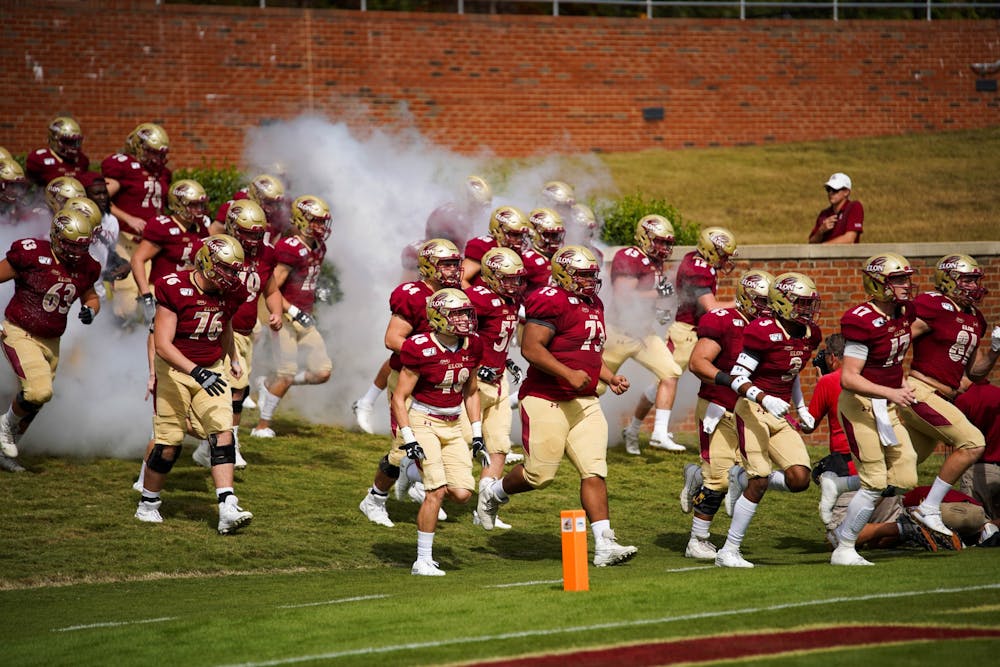Despite the postponement of the fall sports season, student-athletes who have an athletic scholarship at Elon University will maintain their scholarships. According to Clay Hassard, senior associate director of athletics for administration, compliance and campus relations, athletics will be following the NCAA regulations regarding sports and athletes impacted by the coronavirus pandemic.
“We are committed to honoring all of our athletic scholarships that we have issued over the year,” Hassard said. “We have no intention of removing a scholarship from a student athlete because of the COVID epidemic.”
According to the NCAA, 59% of student-athletes receive some sort of financial aid, as Division 1 and 2 schools provide more than $3 billion in scholarships as of 2018.
In addition to maintaining scholarships throughout the pandemic, Hassard said athletes who do not come back to campus in the fall will also keep their athletic scholarships. Hassard said this includes remote instruction as well as taking a semester off.
“We are very sensitive to issues that arise,” Hassard said. “If a young, young man or woman has an issue with being comfortable in a certain situation … the scholarship will not be impacted because of it.”
The NCAA announced in March that spring sport athletes whose seasons were cut short due to the pandemic will maintain their eligibility and scholarships for another year, something Hassard said “less than 10” Elon athletes decided to do. Winter sports in 2019/2020 were not included in this decision, according to the NCAA. The Division 1 Council also adjusted financial aid rules regarding spring sports, allowing teams to have more student athletes on scholarship than normally allowed to accommodate any athletes who chose to take a fifth year. There was no mention of fall sports for 2020.
Normally, there is a limit on how many student athletes can be offered scholarships on each sports team. Hassard said Elon athletics either have the same amount as the regulation states, or less, depending on the year.
The implications the coronavirus could have on collegiate sports going forward are widespread, changing recruiting efforts, revenue and how sports choose to practice and compete. Assistant professor of sports management Mark Cryan, once a collegiate athlete himself, said the pandemic could impact collegiate sports for several years.
Cryan said high school student-athletes normally would market themselves, use recruiting services and play in showcase tournaments, or participate in “scout days,” where the student athletes are evaluated on their skills. According to the NCAA, only approximately 2% of high school student athletes receive athletic financial assistance in college. However, due to spring seasons being canceled, recruiting efforts were changed.
“If you are a college baseball player or high school baseball player planning to go play in some showcase tournaments, those didn’t happen,” Cryan said. “Recruiting in a lot of sports right now has become very, very reliant on video.”
In addition to recruiting efforts, with the NCAA ruling to extend eligibility, Cryan said schools will now have to evaluate how to handle “five years worth of athletes.”
As seasons are postponed, students may be wondering how much money will be lost due to the lack of games and fans. A misconception Cryan sees frequently when students come into the sports management program is the amount of money generated by sports programs at universities. College athletics are a cost to the university much like any other part of the student experience, Cryan said.
“A lot of people are under the impression that every Division 1 college athletic program is a big fountain of money, particularly football, basketball,” Cryan said. “At a program like Elon’s, they have a couple days a year when they draw big crowds, parent’s weekend, maybe a good rivalry game. But other than that, the revenues are pretty small.”
At Elon, Hassard said while “things could change,” athletics does not anticipate at this time any changes to the number of scholarships the university is financially able to offer in the future.


